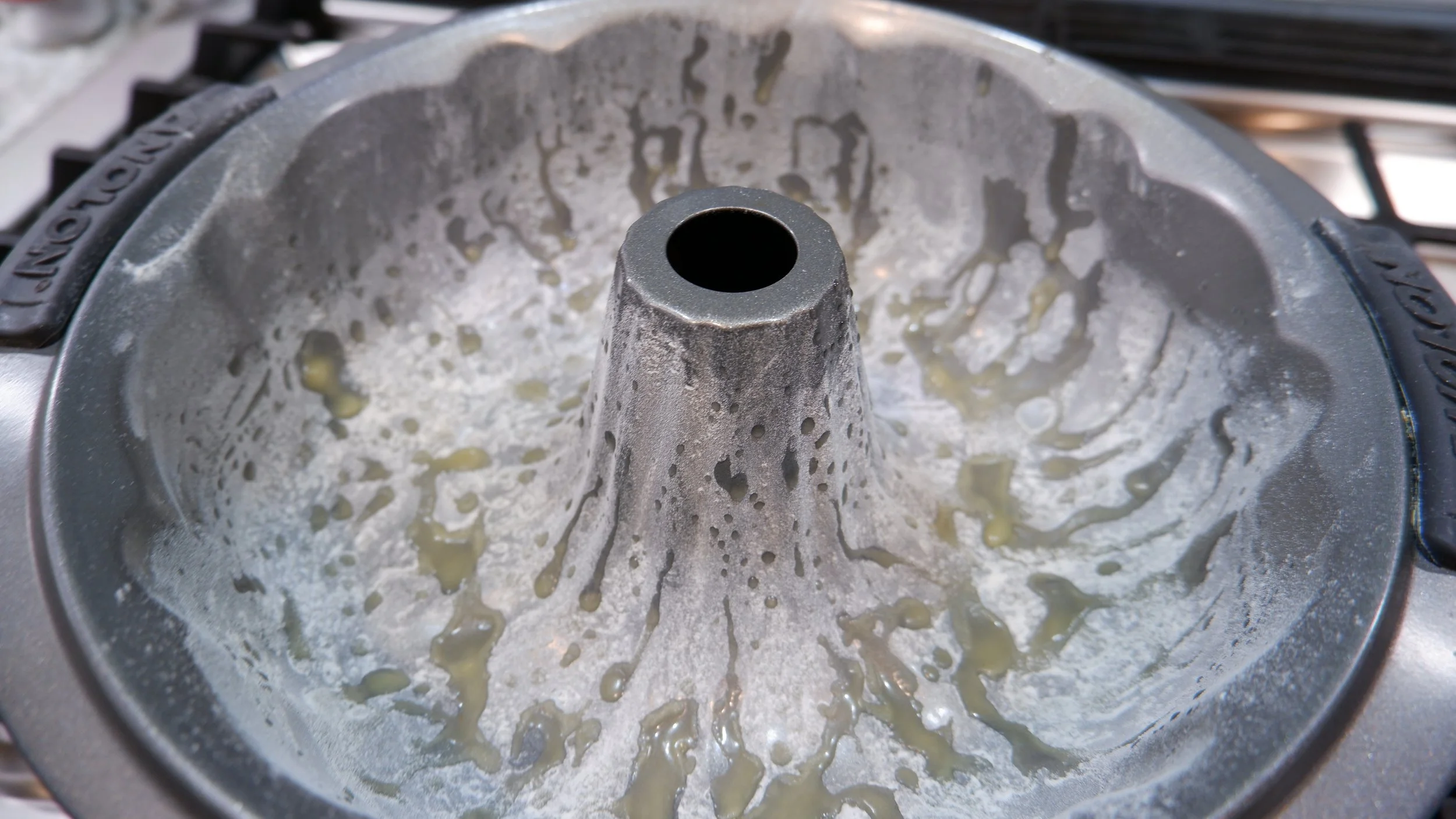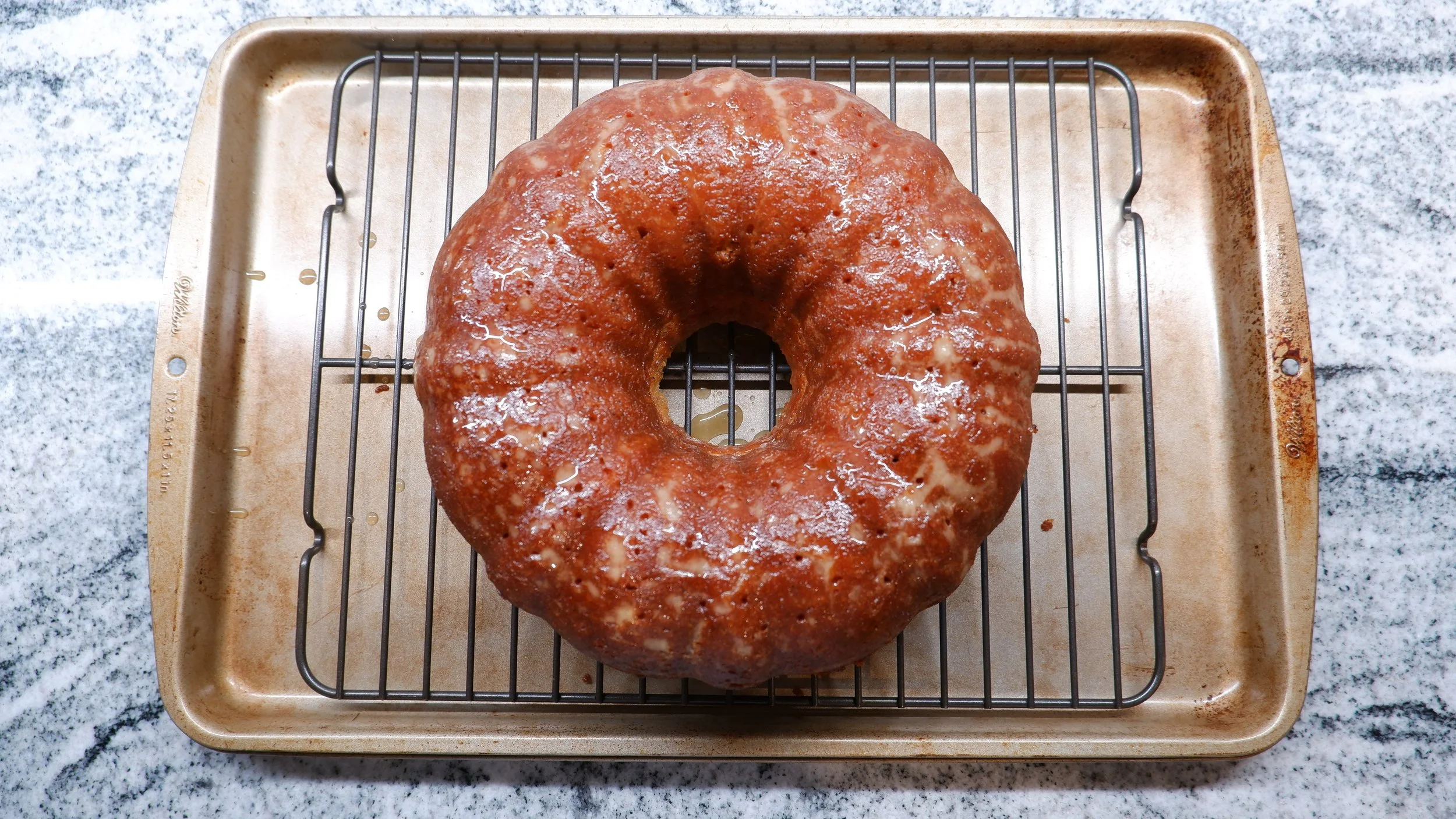Dessert Person Poppy Seed Almond Cake
Claire Saffitz offers a simple cake recipe for all times of year.
Difficulty: 1/5
Ingredient Availability: 5/5
Time: 2 hrs
I don’t know the first time I watched a Claire Saffitz video, but I do know it was on the Bon Appetit Youtube channel. Over time, I really started to appreciate how experienced and creative she was. It makes sense. With more experience, the more comfortable you are trying new and different things. A great showcase of this was her Gourmet Makes series, where she would make a spruced up version of common candies and snacks we all know and love. While this recipe is nowhere near as extreme as those videos, it puts her foundational skills on full display. Without the foundations, she wouldn’t be where she is today. Although I’m not a big fan of almonds, I decided to give this recipe a try because it was one of the easier ones in her book Dessert Person (linked here) and it had an interesting orange glaze. Plus, if she could make me a fan of almonds here, maybe I’d be more open to them elsewhere.
Key Ingredients and Omissions:
I used all of the ingredients, as Claire recommended.
I forgot to put the poppy seeds in this picture.
I used all of the ingredients in this recipe. None of them were difficult to find, and were easily available, so there wasn’t a reason to leave anything out. On top of that, she strongly encourages us “not to change a thing.”
If you can consume milk, there’s no real reason not to drink whole milk. It has way more flavor than skim and 2% milk and is arguably healthier. The fat in the milk is there for a reason after all. While I won’t dive into the reasoning here, just know that for most (if not all) food related uses, whole milk is king. And don’t get me started on non-milk milks.
For my neutral oil, I decided to go with grapeseed oil. While I had vegetable oil, I wanted to use grapeseed oil because it was already opened and isn’t used as often as the vegetable oil is. Honestly, the choice of oil, as long as it is a neutral one, probably makes no difference.
Tools:
Whisk
Cooking Review:
Preparing Pans:
about 5 minutes, if that (keep in mind that I take pictures for all times)
I feel like the biggest fear when making a bundt cake is that you might not be able to get it out of the pan. That’s why this step is so important. While my pan seems to have a non-stick coating and may have done just fine without the coating of oil and flour, not everyone has a non-stick bundt pan. I took the extra precaution and went ahead and made sure there was a nice and (mostly) even coating of flour and oil in my pan and I strongly recommend you do the same, no matter what kind of pan you have. It’s definitely worth the few minutes it takes to get the cake out of the pan with no sweat.
Maybe I added a little too much oil here
Batter:
20 Minutes
Mixing the batter was very easy. Just combine all the dry and wet ingredients separately before mixing them together. Most of the dry ingredients were measured by mass to ensure accuracy to the recipe. In baking, mass measurements are typically better, especially for things like flour, because a lot of the ingredients can compact significantly and throw off the ratios that were intended. I did a quick folding of the wet into the dry before I mixed everything on medium-high (speed 8 on my mixer) for 2 minutes. I thought the batter looked a little thin for a cake batter, which worried me, but I kept moving forward. I knew that I hadn’t made any errors up to this point, so I liked my chances that it would come out ok at least.
Baking:
87 minutes
My oven usually takes a little longer to bake things, than what most recipes say, so after 80 minutes, the top (what will eventually be the bottom) of the cake was pale, but cracked. I let it go for another 7 minutes to what you see here. The metal skewer I used as a cake tester also came out clean at this point. I did notice that the cake was a little wobbly fresh out of the oven. After waiting the suggested 15 minutes to let the cake cool in the pan, I used a small offset spatula to free the cake from any stuck on portions around the sides and inverted it onto a cooling rack. Even with flour and oil prepped pan, I had to tap the inverted pan and rack a few times against the counter to get it to come out, so definitely do not skip that step. I used the same skewer I used as a cake tester to poke holes all over the cake to prepare it for the glaze.
Looks mostly as described in the book, maybe a little more pale
Glaze:
5 minutes
The glaze comes together really simply. I melted my butter in the microwave then mixed all the ingredients in a small bowl. I did have a problem, where some solids wouldn’t dissolve, though. I wasn’t sure If it was the butter solidifying after coming in contact with the orange juice, or a reaction between the milk solids in the butter and the acidic orange juice. In any case, after trying to beat them out and failing to use heat to melt what I thought may be butter fat chunks, I just strained those bits off and proceeded to glaze the cake. I ended up using only about 3/4 cup of the glaze. Maybe I was a little impatient and it could’ve take the rest after letting it all soak in for a little longer, but I was honestly ready to give this cake a try. I let it cool of for a little while longer then cut me a decent size slice.
Analysis:
One of the first things I noticed was the nice crispy exterior of the cake. It was really nice and gave a pleasant contrast to the tender inside of the cake, while giving a slight nutty flavor. Unfortunately, after a day out two, all signs of any exterior crunch were gone. The same couldn’t be said for the flavor, though. The same almond extract flavor, which to me doesn’t really taste like almonds, comes through just as strongly on the second and third days as it did on the first. The orange glaze, despite how odd of a pairing it may sound, paired perfectly with the rest of the cake. Although the orange flavor was on the lighter side most of the time, it was always lingering and a very pleasant surprise when it came on a little stronger in some bites. If you’re a big fan of orange flavor, I’d say go heavier on the glaze than I did. The poppy seeds also added a nice textural element to the cake, which lasted longer than the crispiness that existed on the first day. Overall, there are no complaints about the final product. For how simple this recipe is and how little hand on time it takes, it’s remarkable how good of a product it is. With all that in mind, I’m giving this recipe a 9/10. The only issue I had was with the glaze having some lumps to strain out (see above), which honestly, could’ve been my fault. The flavor profile is unique and interesting, but not super complex and layered (which it’s not trying to be). All in all, this is a recipe I would recommend to anyone who wants to try something different than the typical desserts with chocolate and vanilla at the forefront. Sometimes, trying something new pays off.
Beautiful, flaws and all











